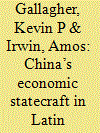| Srl | Item |
| 1 |
ID:
136712


|
|
|
|
|
| Summary/Abstract |
Most scholars and policy-makers classify the motivation behind China’s global economic activity as an effort to project soft power or to exercise “extractive diplomacy” by locking up natural resources across the globe. In this paper we argue that China, through its state financial institutions and firms, is also significantly motivated by simply commercial reasons. To shed light on this debate, we examine the extent to which China’s policy banks provide finance to sovereign governments in Latin America. We find that Chinese policy banks now provide more finance to Latin American governments each year than do the World Bank and Inter-American Development Bank (IDB). Indeed, the large loan size, high interest rates and focus on industry and infrastructure of Chinese finance has less in common with these international financial issue_images_88_1_ChinaLatinAmerica01institutions (IFIs) and more in common with the private sovereign bond market. In this way, Chinese finance appears primarily commercial in nature. Chinese banks offer slightly lower interest rates than the private market, but these are not necessarily concessional subsidies to support a political agenda. The Chinese banks are exposed to less risk because they tie their loans to equipment purchase requirements and oil purchase contracts. Through these risk-lowering arrangements, Chinese banks can profit by lending to countries that have been priced out of the sovereign debt market. While it can be difficult to distinguish between the three types of economic statecraft outlined above, we argue that commercial profit is also a major force behind China’s economic statecraft that has been largely overlooked.
|
|
|
|
|
|
|
|
|
|
|
|
|
|
|
|
| 2 |
ID:
135978


|
|
|
|
|
| Summary/Abstract |
We examine the extent to which Chinese development banks have financed the globalization of China's “national champion” firms: specifically, through outward foreign direct investment (OFDI). We create a database of Chinese finance for OFDI and compare our results to the existing literature and available data on Japan, Korea and other Asian nations. We estimate the total value of China's OFDI finance from 2002 to 2012 at US$140bn. As a percentage of total OFDI, China's lending is roughly three times higher than Japan's, the previous global leader in OFDI finance. We identify two major reasons for China's high (31 percent) ratio of OFDI lending to total OFDI. First, China has a greater incentive to give OFDI loans than Japan or Korea ever did because its borrowers are state-owned so it can more easily channel funds to targeted areas. Second, China has a greater capacity to give OFDI loans because it has significantly higher savings and foreign exchange reserves than Japan and Korea.
|
|
|
|
|
|
|
|
|
|
|
|
|
|
|
|